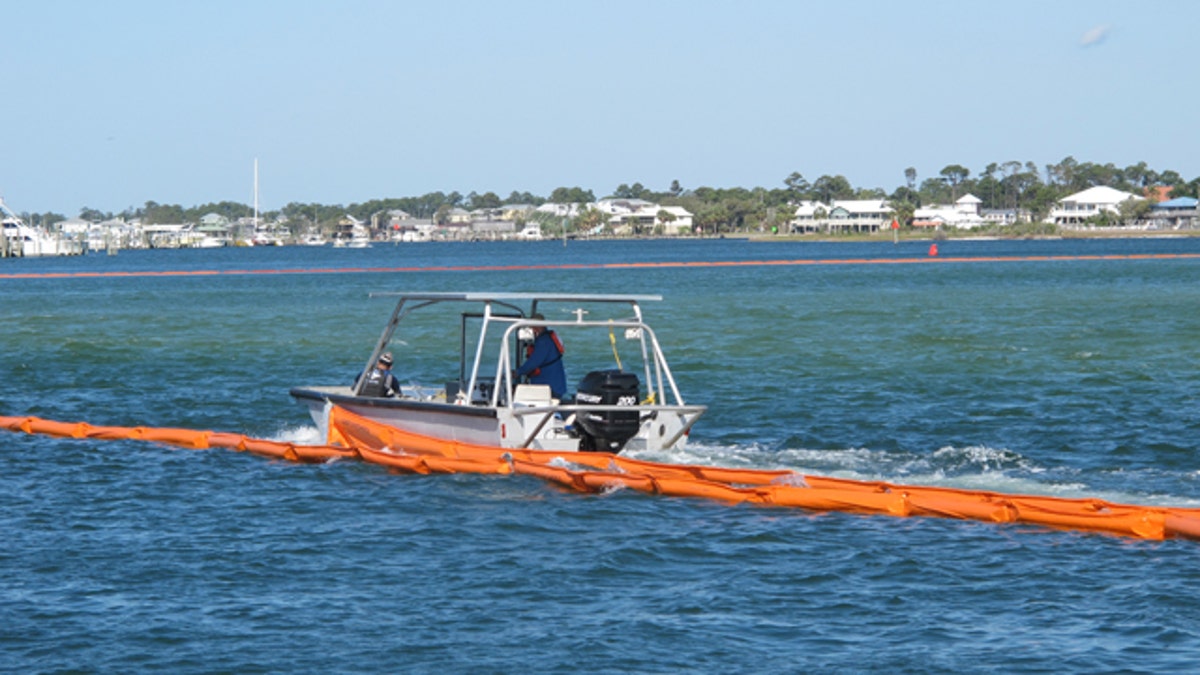
April 29, 2010: Workers in Orange Beach, Ala., lay inflatable orange booms to protect the beach and wildlife against a massive oil spill nearing the coastline. (Fox News)
As a massive oil slick creeps ever closer to the Gulf Coast, officials in Louisiana, Alabama, Texas, Mississippi and Florida are bracing for the worst. The economic impact over miles of prime coast land has the potential to be catastrophic.
Officials say the slick from last week's offshore drilling rig explosion in the Gulf of Mexico may have a devastating impact on one of the coastal states' most precious commodities — shrimp — and the entire industry that surrounds it. And state officials acknowledge that the oil's effect on travel and tourism to the area could be equally destructive.
"Common sense would tell us that if the shrimp and oyster beds are impacted, that could potentially affect one of the signature items for Louisiana — our shrimp," Louisiana's assistant secretary of tourism, Jim Hutchinson, told FoxNews.com.
About 5,000 barrels of oil a day are coming up from the seabed after a BP-operated rig, the Deepwater Horizon, exploded and sank last week about 40 miles offshore, leaving 11 workers missing and presumed dead. Federal officials say the leading edge of the spill was expected to reach the Mississippi River delta by Thursday night.
In an interview with FoxNews.com, Deborah Long, spokeswoman for the Southern Shrimp Alliance, said the oil could have a "dramatic effect" on the shrimp industry's ability to stay in business.
"There's a deep concern about the potential effects of the spill on the shrimp stocks," Long said, adding that the U.S. shrimp industry and BP have deployed booms and other resources as a precautionary measure to protect the shrimp, which commercial fishermen depend on to make a living.
Long said that the spill's impact on the industry depends on a "number of variables," which she said "are still unknowns at this point." The volume of the spill, as well as the outcome of the containment efforts, will be key in determining the damage that the oil slick will have on the country's most fertile seafood grounds.
The shrimp season begins in early May, as the shrimp move from estuaries out to sea, Long said. U.S. landings of shrimp were valued at $441.8 million in 2008 — an increase of $9.1 million compared to 2007. Louisiana leads the nation in its shrimp supply -- with 89 million pounds produced in 2008 — followed by Texas, Alabama, Florida and Mississippi.
Hutchinson said that while the effect on wildlife and the fragile ecosystem along the coastline remains the "area of biggest and immediate concern," officials are hoping that the travel and tourism industries in the region will not also be devastated by the oil spill.
The Gulf states play host to tourists from around the world, and industry officials acknowledge that the spill could have a massive economic impact.
In states like Florida, where tourism is a $65.5 billion industry, and Alabama, which brings in $6 billion, officials are closely monitoring any changes in hotel bookings and travel plans.
Mike Foster, vice president of marketing at the Alabama Gulf Coast Convention and Visitors Bureau in Orange Beach, Ala., said he spoke Wednesday with two major hotel and condominium partners and found few changes in reservations.
"There are very few cancellations" at this time, he told FoxNews.com.
Orange Beach, Ala., saw about 1.3 million visitors from 2008 to 2009, raking in $533 million in travel expenses, including food, lodging and recreation.
Foster and Hutchinson both stressed that it is too early to speculate the impact, if any, of the oil slick on the travel and tourism industry.
"It's a tragedy on so many different levels," Hutchinson said. "As far as specific tourism concerns, none have been broached directly with me."
FoxNews.com's Cristina Corbin and the Associated Press contributed to this report.

